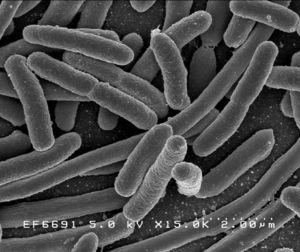Barry J. Marshall
and J. Robin Warren
for their discovery "bacterium Helicobacter
pylori and its role in gastritis and
ulcer" in this year's Nobel Prize in Physiology or Medicine
made a remarkable and unexpected discovery that inflammation in
stomach (gastritis) and gastric
or duodenum (peptic ulcer) is the result >> << stomach infection caused by bacterium helicobacter pylori >>. << Robin Warren (born 1937), a pathologist from Perth, Australia >> << observed small curved bacteria colonizing
lower abdomen (cavity) in approximately 50% of patients
from which biopsies were taken. He made a crucial observation >> ; << that signs of inflammation were always present >> << in the mucosa of the stomach along which bacteria
seen. Barry Marshall (born 1951), a young guy clinical,
interested in the conclusions of Warren and together they started
research biopsies in 100 patients. After several attempts, Marshall succeeded in growing
previously unknown species of bacteria (hereafter denote
Helicobacter
pylori) from several of these biopsy.
However, they found that the organism was present in almost all >> << patients with inflammation of the stomach, duodenum or stomach ulcer. Based on these results, they suggested that << Helicobacter >>
pylori is involved in the etiology of these diseases. Although ulcers can be healed by inhibiting gastric acid
, they often relapse because
bacteria and chronic inflammation stomach remained. In treatment studies, Marshall and Warren, and other
revealed that patients can be cured by
ulcer disease only when the bacteria were destroyed
from the stomach. Through innovative opening
Marshall and Warren, peptic ulcer disease is no longer
chronic, often disabling condition, but the disease >> << that may be cured by a short circuit antibiotics and acid secretion
inhibitors. Ulcer disease infectious disease! This year's Nobel Prize in Physiology or Medicine
is Barry Marshall and Robin Warren, who with tenacity
prepared mind and challenge prevailing dogma.
Using technology generally (fiber endoscopy, silver
staining of histological sections and culture techniques
microaerophilic bacteria), they have an undeniable case that the bacteria >>
Helicobacter Pylori is
cause disease. For cultivation of bacteria They made her >> << are scientific research. In 1982, when this bacterium
discovered Marshall and Warren, stress and lifestyle
considered the main causes of peptic ulcer. Now firmly established that
Helicobacter Pylori causes
90% of duodenal ulcers and up to 80% of gastric ulcers >>. << connection
pylorus Helicobacter infection
and subsequent gastritis and ulcer was
were installed in studies of human volunteers
antibiotic treatment studies and epidemiological studies. Helicobacter Pylori Helicobacter Pylori is a spiral gram-negative bacterium >> << that colonizing the stomach about 50% of all people
In countries with high socio-economic standards
infection is much less than in developing countries
. countries where virtually everyone may be infected.
The infection is usually contracted in early childhood, often
through transmission from mother to child, and >> << bacteria can remain in the stomach for the rest of life
rights. This chronic infection starts at the bottom
part of the stomach ( antral). As first reported
Robin Warren, the presence of Helicobacter pylorus
is always associated with inflammation of the main >> << gastric mucosa, as evidenced by infiltration of inflammatory cells> ;>. << severity of this inflammation and location
in the stomach is critical for
diseases that can result from helicobacter infection. Most people
helikobakterioz flows asymptomatic. However, about 10-15% of infected people >> << a while experience peptic ulcer disease. These ulcers
often in the duodenum than the stomach itself. Severe complications include bleeding and perforation . >> << current position is that the chronic inflammatory process in >> << distal part of the stomach strattera 40mg caused by Helicobacter Pylori >> << infection leads to increased production of acid
with uninfected upper body of the stomach. This leads to the development of ulcers in the more vulnerable
duodenum. cancer associated with Helicobacter Pylori Some people Helicobacter Pylori also
impressive body region of the stomach. It >> << results in more widespread inflammation that does not attract
only ulcers in the body and stomach cancer.
This has decreased the incidence of cancer in many countries in >> << second half of last century, but still takes >> << and number two in the world in deaths from cancer.
inflammation in the gastric mucosa is a risk factor for a particular type >> << lymphatic neoplasm in stomach, MALT (mucosa
lymphoid tissue) lymphoma. Since such lymphomas may regress
, where
Helicobacter Pylori is eradicated
antibiotics, bacteria play an important role >> < <in the preservation of this tumor. Helicobacter Pylori is present >> << only in humans and adapted to the environment of the stomach. Only a fraction of infected people develop stomach
disease. After the discovery of Marshall and Warren, research
was tense. information underlying the exact pathogenetic mechanisms
ever be solved. bacterium itself is extremely diverse, and strains
differ in many aspects such as compliance >> < <gastric mucosa and the ability to cause inflammation. Even one infected person all bacteria
do not match, and during chronic infection bacteria
adapt to changing conditions in the stomach over time >> << . In addition, genetic variation between individuals may influence their susceptibility
to
Helicobacter pylori.
Not until recently, animal models was found
Mongolian gerbils. In this animal study ulcer Disease
and malignant transformation promise to give more
details on disease mechanisms. helicobacter infection can be diagnosed
on antibody tests, identifying the body of >> << biopsy taken during endoscopy, or non-invasive breath
test that detects bacterial production >> << enzymes in the stomach. Indiscriminate use of antibiotics to eradicate Helicobacter
pylori and from healthy carriers will
serious resistance of bacteria to these >> << important drugs. Thus, treatment of helicobacter pylori
be used in limited patients
without documented gastric or duodenal ulcer. microbial origin of other chronic inflammatory diseases >> <<? Many diseases in humans such as Crohn's disease, ulcerative colitis
, rheumatoid arthritis and atherosclerosis
associated with chronic inflammation. discovery that one
the most common diseases of mankind, peptic ulcer,
a microbial cause, has stimulated search >> << microbes as possible causes of other chronic inflammatory diseases. Even though no specific answers to hand, recent data
clearly indicate that dysfunction >> << recognition of microbial products immune system can result in
in the disease. opening
Helicobacter pylorus led to a deeper understanding of the relationship between
chronic infection, inflammation and cancer




